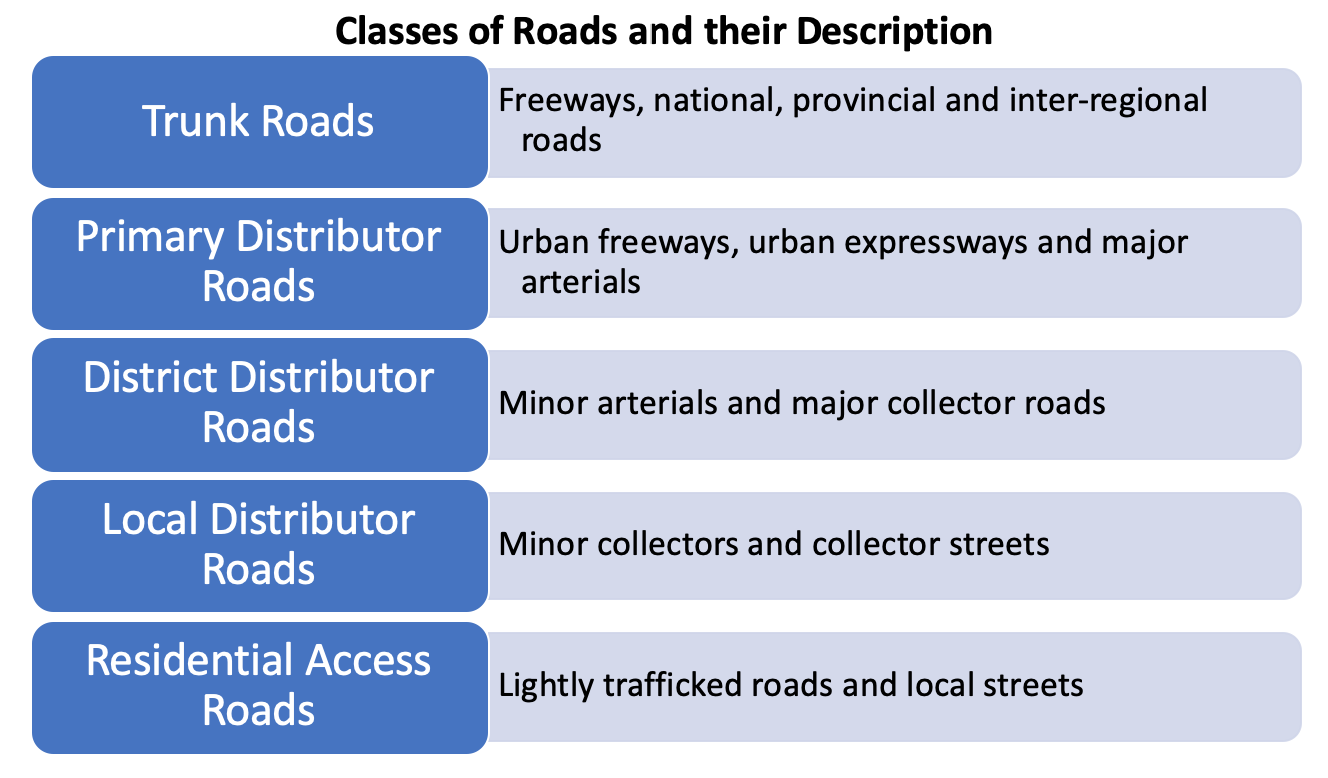
................................................................................................................................................................
5 Major Classes of Roads
By: Haseeb Jamal
Classes of Roads
Following are the major classes of Roads:
1.
Trunk Roads
2.
Primary Distributor
Roads
3.
District
Distributor Roads
4.
Local Distributor
Roads
5.
Residential Access
Roads
Classes of Roads


Trunk roads:
The main function of this class of roads is to facilitate
regional distribution of traffic (intercity movement).
They may be national or provincial roads and the type of
facilities found in this class are freeways, expressways, dual carriageways and
single carriageway main roads, national, provincial and inter-regional roads.
Primary distributors:
This class of road forms the primary network for the urban
area as a whole.
All long distance traffic movements to, from and within
the city should be focused onto such roads.
Characteristics are high volumes, restricted access and
fairly high speeds. Continuity of route is important.
Examples of this class of roads are Urban freeways, urban
expressways and major arterials.
District Distributors:
Class 3 roads distribute traffic between the various
residential, industrial and principal business districts of the town and form
the link between the primary network and the roads within residential areas.
Examples include Minor arterials and major collector
roads.
Local Distributors:
Local distributors are "local" through-roads
which distribute traffic within communities and link district distributors.
Local bus services are routed along this class of road.
The local distributor should carry traffic from a housing
module of more than 400 and up to about 1 500 dwelling units. For example Minor
collectors and collector streets.
Residential Access Roads:
Residential access roads give people direct access to
buildings and land within environmental areas.
Access for motor vehicles is not their only function. They
are used by the inhabitants for other work, or leisure-time activities such as
walking, jogging and playing, as well as for the provision and maintenance of
services to houses.
Examples of this include Lightly trafficked roads and
local streets.
Haseeb
Jamal . I am a Civil
Engineer, graduated from University
of Engineering and Technology, Peshawar, Pakistan in 2010. I also
have a PG-Diploma in Disaster Management and
MS in Urban
Infrastructure Engineering (In Progress). My expertise include civil
related softwares like AutoCAD,
SAP2000, MS Project, Primavera, MS Office and GIS. My technical skills include
project management, monitoring and evaluation, structural assessment, disaster
risk management, Quantity survey, land survey, material testing, site
management and technical writing. I am trained in writing project progress
reports as well as proposals and concept papers. I have also received advanced
training on surveying, proposal writing, Monitoring and Evaluation of projects
as well as organizations.
I have worked as Project
Engineer at National Research and Development Foundation, Peshawar and
CENCON Associates. I also worked with Spectra Engineering Solutions as Senior
Civil Engineer in monitoring of World Bank and UNDP funded projects all
over Khyber Pakhtunkhwa and FATA. Currently, I am working as Deputy
Manager Development at NayaTel, Peshawar.


No comments:
Post a Comment